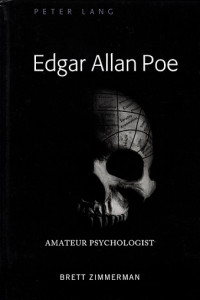Edgar Allan Poe: Amateur Psychologist

Brett Zimmerman
Year of Publication: 2019
Publisher website
Edgar Allan Poe: Amateur Psychologist is the "first and foremost" major source of information dedicated to the theme of Poe and psychopathology. Its introduction, conclusion, chapters, and appendices highlight and employ the best insights from earlier and current scholars, but this text goes beyond them in its analysis of Poe’s relation to mainstream psychology and its rival system, phrenology. His knowledge of this subject matter is far broader and deeper than Poe specialists have hitherto supposed; his method—contrary to the "Poe myth" according to which an alcoholic, drug-addicted, tormented artist wrote to exorcise his own pathologies—was to research mental illnesses for the sake of scientific precision and verisimilitude. We also come to appreciate the interrelatedness of the psychopathologies he illustrates and other "knowledge frames," characteristic themes, featured in his tales, such as the occult, symbology, chromatography, the "cult of sensibility," Neoplatonism, and Transcendentalist epistemology. While locating Poe firmly within the science and pseudoscience of his time, Edgar Allan Poe: Amateur Psychologist simultaneously looks back from the 1830s and 40s (when Poe’s literary career was at its height) to theories and possible sources of information from the late eighteenth century, as well as forward to the twentieth and twenty-first centuries to demonstrate how Poe’s theories of mind, and his depiction of psychological illnesses, occasionally anticipate modern insights and therapies. The book will be of interest not only to Poe scholars but also to students, teachers, and any intelligent reader interested in psychology, psychotherapy, and the history of ideas.
